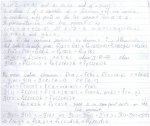See attachment for the question.
I attempted this question as follows:
Let a = (a,b) and c=(c,d)
Since the function has continuous partial derivatives, therefore the La(x,y) = f(a,b) + fx(a,b) * (x-a) + fy(a,b) * (y-b).
And I know that f(x,y) = La(x,y) + the error = La(x,y) + 1/2 * [fxx(c)(x-a)^2 + fyy(c)(y-b)^2 + 2*fxy(c)(x-a)(y-b)]
But I dont' know how to go from here to get to f(x,y) = f(a,b) +fx(c,d) *(x-a) + fy(c,d)(y-b) which equal to f(x,y) = f(a,b) +fx(c) *(x-a) + fy(c)(y-b)
So does this mean I have to prove that fx(a)=fx(c) and fy(a)=fy(c)
Thanks.
I attempted this question as follows:
Let a = (a,b) and c=(c,d)
Since the function has continuous partial derivatives, therefore the La(x,y) = f(a,b) + fx(a,b) * (x-a) + fy(a,b) * (y-b).
And I know that f(x,y) = La(x,y) + the error = La(x,y) + 1/2 * [fxx(c)(x-a)^2 + fyy(c)(y-b)^2 + 2*fxy(c)(x-a)(y-b)]
But I dont' know how to go from here to get to f(x,y) = f(a,b) +fx(c,d) *(x-a) + fy(c,d)(y-b) which equal to f(x,y) = f(a,b) +fx(c) *(x-a) + fy(c)(y-b)
So does this mean I have to prove that fx(a)=fx(c) and fy(a)=fy(c)
Thanks.


